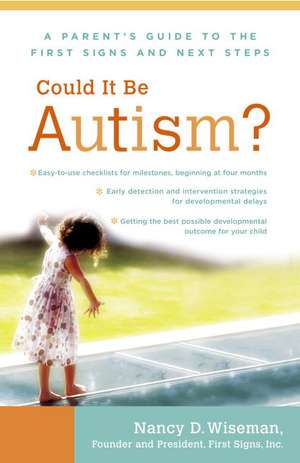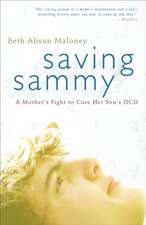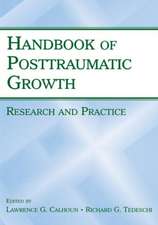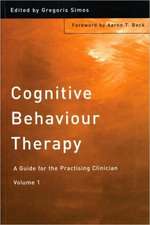Could It Be Autism?: A Parent's Guide to the First Signs and Next Steps
Autor Nancy Wiseman Kim Painter Koffskyen Limba Engleză Paperback – 31 mar 2007
Nancy Wiseman is the founder and president of First Signs, the organization dedicated to educating parents, clinicians, and physicians on the early identification of and intervention for developmental delays. She is also the mother of a child who was diagnosed with autism at the age of two, and she draws on her own experiences as well as the latest research to present real strategies. Emphasizing warning signs, she describes the most important milestones at each stage of a child’s growth, including things parents and pediatricians often overlook. She also empowers parents to act on their instincts and initial concern, rather than to “wait and see,” which is often encouraged.
The book explains the steps parents can take to confirm or rule out a developmental delay or disorder. It details various diagnoses and show how sometimes multiple diagnoses may apply. But even more valuable is the information on how to design and implement the best intervention plan based on a child’s unique developmental profile. Different treatments and therapies are outlined so parents can explore and understand what may work best for their child, based on his or her particular strengths and weaknesses.
Ultimately, Could It Be Autism? is about giving parents hope--hope that they can know one way or the other where their child is developmentally and hope that they can give their child what he or she needs to have the best life possible.
Preț: 99.41 lei
Nou
Puncte Express: 149
Preț estimativ în valută:
19.02€ • 19.79$ • 15.71£
19.02€ • 19.79$ • 15.71£
Carte disponibilă
Livrare economică 22 martie-05 aprilie
Preluare comenzi: 021 569.72.76
Specificații
ISBN-13: 9780767919739
ISBN-10: 0767919734
Pagini: 257
Dimensiuni: 136 x 204 x 15 mm
Greutate: 0.3 kg
Editura: BROADWAY BOOKS
ISBN-10: 0767919734
Pagini: 257
Dimensiuni: 136 x 204 x 15 mm
Greutate: 0.3 kg
Editura: BROADWAY BOOKS
Notă biografică
Nancy Wiseman is the founder and president of First Signs, Inc., a national nonprofit organization dedicated to educating parents and pediatric professionals about the early warning signs of autism and other developmental disorders. First Signs provides professionals with tools and training and parents with education and support to help young children stay on a healthy developmental path. Nancy is the mother of Sarah, who was diagnosed with autism at the age of two. Today—at age nine—Sarah stands as a powerful and positive example of the impact that early identification and intensive intervention can have on young children with developmental delays and disorders. This little girl, once so profoundly delayed, has made remarkable progress, much like the organization she inspired seven years ago.
Extras
Chapter One
You Make a Difference
You are a parent, not a doctor or a scientist.
But, when it comes to your child, you are an expert. You know that little face and whether it lights up when you walk into a room. You know your baby's babbling, burbling voice and would be the first to notice if it suddenly fell silent. You know how your toddler behaves when he sees a new toy, meets a new child, goes to a birthday party, or visits a shopping mall. You know what makes her cry and what makes her laugh. And, while your pediatrician has seen hundreds of sore throats and infected ears, you've seen a few things too. You've seen children playing in parks and squabbling at family dinners. You've seen babies playing peek-a-boo and preschoolers playing house. And you wouldn't be a parent if you had not compared your child to those children--if you had not noticed how your child resembles them and differs from them.
Of course, not every difference is a disorder. Far from it. But if your instincts are telling you something is wrong--that something about your child is quite different from other children or that something essential about your child has changed or become increasingly troubling, your instincts are probably right.
You Know When Something Is Wrong
As part of my work with First Signs, I've spent a lot of time talking with doctors and researchers about the differences between young children with developmental delays and those without them. Time and time again they tell me about one crucial difference. Children with developmental delays have parents who are persistently worried about them. So, if you are worried about how your child is developing, how he or she is learning and behaving, you should take your worry seriously. It could be a warning sign.
Parents have been diagnosing their children from early on. They know it, they feel it. They say to me all the time, "I just know something's just not right . . . the way he does this or the way he does that . . ." And they're right, usually.
Anne Holmes, director of outreach services at Eden Family of Services, Princeton, N.J.
All parents worry about their children sometimes. All occasionally need some reassurance that the quirks they see are just that. One survey found that 70 percent of parents in pediatric waiting rooms had questions about their children's development or behavior. When something really is wrong, though, the worry does not go away. The child's differences don't go away, either. Usually they just become more apparent, more troubling.
Some parents whose children are eventually diagnosed with autism and or other developmental disorders realize that their children are different as babies. A few notice specific, clear-cut problems; many others have nagging, vague concerns that are harder to express.
From the day I brought him home from the hospital, I knew there was something going on. He couldn't feed, he couldn't suck a bottle. And, as a toddler, he couldn't give kisses. He would go to kiss me and would just bang his face into my mouth.
Kathy Bauer of Pennsylvania, mother of Andy, diagnosed with speech apraxia at age three
She was five or six months old when I first started feeling something wasn't right. But I couldn't put my finger on it. I felt like I was bonding to her, but she wasn't bonding to me.
Becky Wilson of Oregon, mother of Zoë, diagnosed at age four with developmental language disorder and "regulatory disorder with autistic behaviors"
Other parents see signs accumulate over time or appear suddenly, often between the first and second year of a child's life.
When Evan was fifteen months old I noticed he wasn't behaving like other children of his age. . . . He wasn't interacting with the world like other kids.
Susan Sutherland of Massachusetts, mother of Evan, diagnosed with PDD-NOS around age three
When doctors ask the right questions, worried parents almost always speak up. And, once their child is diagnosed with a problem, even those parents who do not express their worries at first usually say that they knew "something was wrong." Often they "just burst into tears" when their fears are confirmed, one researcher says. "They will say, 'I was worried about my child, but I thought I was just being an anxious parent.' "
Studies show that parents of all educational, cultural, and economic backgrounds are able to recognize developmental warning signs. Where do parents get this amazing power of prediction? From observing their child and the children around them.
Pediatricians see a child for about fifteen minutes during a "well" visit. Parents see their children every day, all day, in all sorts of settings. They also see other children, alone and in groups, in the grocery store, at church, even in the pediatric waiting room. They see siblings, cousins, playmates, and neighbors. Everywhere they go, they compare and notice how their child is like other children and how he or she is different.
I remember when my daughter was eighteen months old, you'd say, "Go close the door," and she'd go close the door. My son had no receptive language. If you said, "Go close the door," he'd just stand there.
Brenda Eaton of Pennsylvania, mother of Brendan, diagnosed with autism at age three
If you're around children all the time, you realize the way they can communicate without even saying a word. He didn't have that at a year or eighteen months.
Ellen Weitzen of New Jersey, mother of Chris, diagnosed with autism at age three
One clinical professor I know used to train young pediatricians to recognize developmental disorders. Sometimes she would send her trainees to day care centers and schools so that they could see what parents see all the time--children playing, talking, and learning together. She told me about one trainee who was not convinced that a five-year-old with a technically normal but lower than average IQ needed special help. The young doctor was sent to a day care center, where he observed typical four- and five-year-olds at play. That did the trick. He quickly saw that the child with the apparently okay test scores was lagging far behind in speech. The child was not okay at all.
Finding a Professional Partner
Still, you may believe that what you know about your child pales in comparison to what seasoned pediatricians, family physicians, and nurse practitioners know about the science of development. If you've taken your child to every routine checkup and gotten a clean bill of health, you may feel that's reassurance enough. Unfortunately, that's not the case. While most health professionals do a good job of assessing physical development and try to measure cognitive growth, far too few know how to assess social and emotional development or how to interpret the early behavioral signs of disorders like autism. Some well-meaning doctors ask about these topics, but use the wrong questions. Others rely on their own, too-brief observations. And, unfortunately, far too few children with developmental delays and disorders get the early, intensive help that could put them on a healthier path.
The good news is that you can do something about this. You already know a lot about your child. You are about to learn a lot more about how to assess your child's social and emotional development and how to get prompt help if it's needed. To take full advantage of the advice in this book, though, you also need at least one professional partner. For most parents, that partner will initially be a pediatrician or family physician.
Parents might know something is wrong, but we don't know what, and it's really up to the pediatrician to help us.
Gary Weitzen of New Jersey, father of Chris, diagnosed with autism at age three
In an ideal world, you'd already have a virtual T. Berry Brazelton on your personal team. Like the legendary child care guru, your child's pediatrician would be someone who believes in taking care of whole children and whole families, not just broken legs and sore throats. That doctor also would be well trained in child development and thoroughly up-to-date on the latest research in developmental disorders and how to detect them. She would find a way to fit routine developmental screening into her practice. And she would refer every child with developmental delays to other appropriate professionals for immediate evaluation and help. When parents had trouble getting past long waiting lists or finding the right specialist, she would do all she could to help cut through the red tape.
There are some doctors like that. In fact, the best pediatricians I know say that being an advocate for parents and children is an essential part of their jobs. They expect to spend part of their workday helping families connect with other professionals and other services. They make it their business to know what assistance is available in their communities.
These same pediatricians take seriously their responsibility to follow a child's development. They are not annoyed or put on the defensive when parents, often armed with questions gleaned from a stack of books, want to talk about their children's social and emotional development.
If your child's current doctor lacks these qualities, you are at a great disadvantage. You will find it much harder to sort out your worries about your child and, if needed, get expert, timely help. So, before you go much further, it may be time to shop for a new pediatrician or family physician.
Maybe, like me, you carefully picked your child's current doctor even before your baby was born. I remember visiting four pediatricians during the final weeks of my pregnancy and feeling that I'd been very thorough in my search. I asked about things like office hours and support for breastfeeding and picked a doctor I felt I could call in the middle of a three a.m. crisis. But I found out that my carefully chosen, highly recommended pediatrician was not too pleased with my three a.m. phone calls. My second pediatrician was great about middle-of-the-night phone calls, but did not recognize that my daughter was in developmental trouble.
I eventually found a more knowledgeable pediatrician. And so can you. Ask other parents for recommendations. When you hear of a good prospect, schedule a time to go in and talk with him or her, preferably without your child along. If you choose a practice and later become dissatisfied, try again. This process can be time-consuming, but will be well worthwhile, especially if your child has a developmental delay. Ideally, you will find a pediatric practice where:
*developmental screening and observation are a routine part of every well-child visit.
*doctors are well informed and eager to discuss development. When you go for that consultation, ask questions like "What do you look for at each stage of development?"; "During a typical visit, when and how do you check development?"; and "Where do you refer children with developmental difficulties?"
*doctors get to know the children under their care. That means that your child usually sees the same physician or nurse practitioner, whether for sick or well visits. If it's a large practice, be sure to ask whether you can pick a particular doctor and stick with her.
*doctors are accessible, and not only in emergencies. They take phone calls every day or answer e-mails from patients.
*other staff members are accessible and helpful. Believe me, one helpful receptionist or nurse can make a huge difference should your child need complicated care.
One caveat: while it would be great if all of us had many pediatricians to choose from, your insurance policy may limit your choices and so may geography. Some parents are lucky enough to live in big metropolitan areas with many competing doctors, but others live in rural communities where just one or two doctors serve families for many miles around. If that's your situation, you may have to work especially hard to get what your child needs.
It Comes Down to You
The truth remains that no matter how good your pediatrician is, you are your child's best observer and greatest champion. You are the gatekeeper, the person who stands between your child and the rest of the world, deciding which experiences and people to invite in and which to try to keep out. For parents of typically developing children, being a gatekeeper means choosing the best preschool or the most nurturing nanny. It might mean banning certain TV shows or toys.
Parents' Rights
First Signs believes that if you are a parent concerned about your child's development, you have a right to
*share concerns with health care providers and educators
*be listened to and taken seriously
*get developmental screening for your child at every well visit
*have time to ask questions and express concerns, even if that means scheduling extra meetings or appointments
*get quick follow-up appointments
*see a specialist for a full evaluation
*seek a second opinion
*get answers to all of your questions about development and about your child
*participate in major decisions about your child's care and education
*know all the treatment and educational options available when a problem is found
*change doctors when you are dissatisfied and get complete records transferred to new doctors
*get copies of any of your child's medical records
*request an interpreter if any provider does not speak your language
*protect your family's privacy
For parents whose children turn out to have developmental challenges, being a gatekeeper means all that and much more. It means choosing the people who can best help you and your child to navigate an often uncertain path toward the best possible outcome. It means working with those people to decide what is best for your child, but often making the final decisions yourself. It means becoming a true advocate.
If you have picked up this book, you are already thinking about how to be a better advocate for your child. Even if your child turns out to have no developmental problems, you will find yourself advocating for many years to come--working with doctors, teachers, coaches, and others to get what's best for your son or daughter. If your child does have a delay or disorder, your duties will be even more demanding. You may find yourself negotiating with developmental psychologists, pediatric neurologists, school administrators, and veritable armies of therapists. And you may be overwhelmed at times with all the treatment options and conflicting opinions about what is right for your child. You may feel you've been assigned a job for which you are ill qualified.
Never forget, you are uniquely qualified. You know more, and care more, about your child than anyone else. You are the only one who can make sure he gets what he needs from the larger world. All you require is a little more information and a few more skills. So, learn more about why it's so important to act on your concerns--and then take action. Your child is depending on you.
From the Hardcover edition.
You Make a Difference
You are a parent, not a doctor or a scientist.
But, when it comes to your child, you are an expert. You know that little face and whether it lights up when you walk into a room. You know your baby's babbling, burbling voice and would be the first to notice if it suddenly fell silent. You know how your toddler behaves when he sees a new toy, meets a new child, goes to a birthday party, or visits a shopping mall. You know what makes her cry and what makes her laugh. And, while your pediatrician has seen hundreds of sore throats and infected ears, you've seen a few things too. You've seen children playing in parks and squabbling at family dinners. You've seen babies playing peek-a-boo and preschoolers playing house. And you wouldn't be a parent if you had not compared your child to those children--if you had not noticed how your child resembles them and differs from them.
Of course, not every difference is a disorder. Far from it. But if your instincts are telling you something is wrong--that something about your child is quite different from other children or that something essential about your child has changed or become increasingly troubling, your instincts are probably right.
You Know When Something Is Wrong
As part of my work with First Signs, I've spent a lot of time talking with doctors and researchers about the differences between young children with developmental delays and those without them. Time and time again they tell me about one crucial difference. Children with developmental delays have parents who are persistently worried about them. So, if you are worried about how your child is developing, how he or she is learning and behaving, you should take your worry seriously. It could be a warning sign.
Parents have been diagnosing their children from early on. They know it, they feel it. They say to me all the time, "I just know something's just not right . . . the way he does this or the way he does that . . ." And they're right, usually.
Anne Holmes, director of outreach services at Eden Family of Services, Princeton, N.J.
All parents worry about their children sometimes. All occasionally need some reassurance that the quirks they see are just that. One survey found that 70 percent of parents in pediatric waiting rooms had questions about their children's development or behavior. When something really is wrong, though, the worry does not go away. The child's differences don't go away, either. Usually they just become more apparent, more troubling.
Some parents whose children are eventually diagnosed with autism and or other developmental disorders realize that their children are different as babies. A few notice specific, clear-cut problems; many others have nagging, vague concerns that are harder to express.
From the day I brought him home from the hospital, I knew there was something going on. He couldn't feed, he couldn't suck a bottle. And, as a toddler, he couldn't give kisses. He would go to kiss me and would just bang his face into my mouth.
Kathy Bauer of Pennsylvania, mother of Andy, diagnosed with speech apraxia at age three
She was five or six months old when I first started feeling something wasn't right. But I couldn't put my finger on it. I felt like I was bonding to her, but she wasn't bonding to me.
Becky Wilson of Oregon, mother of Zoë, diagnosed at age four with developmental language disorder and "regulatory disorder with autistic behaviors"
Other parents see signs accumulate over time or appear suddenly, often between the first and second year of a child's life.
When Evan was fifteen months old I noticed he wasn't behaving like other children of his age. . . . He wasn't interacting with the world like other kids.
Susan Sutherland of Massachusetts, mother of Evan, diagnosed with PDD-NOS around age three
When doctors ask the right questions, worried parents almost always speak up. And, once their child is diagnosed with a problem, even those parents who do not express their worries at first usually say that they knew "something was wrong." Often they "just burst into tears" when their fears are confirmed, one researcher says. "They will say, 'I was worried about my child, but I thought I was just being an anxious parent.' "
Studies show that parents of all educational, cultural, and economic backgrounds are able to recognize developmental warning signs. Where do parents get this amazing power of prediction? From observing their child and the children around them.
Pediatricians see a child for about fifteen minutes during a "well" visit. Parents see their children every day, all day, in all sorts of settings. They also see other children, alone and in groups, in the grocery store, at church, even in the pediatric waiting room. They see siblings, cousins, playmates, and neighbors. Everywhere they go, they compare and notice how their child is like other children and how he or she is different.
I remember when my daughter was eighteen months old, you'd say, "Go close the door," and she'd go close the door. My son had no receptive language. If you said, "Go close the door," he'd just stand there.
Brenda Eaton of Pennsylvania, mother of Brendan, diagnosed with autism at age three
If you're around children all the time, you realize the way they can communicate without even saying a word. He didn't have that at a year or eighteen months.
Ellen Weitzen of New Jersey, mother of Chris, diagnosed with autism at age three
One clinical professor I know used to train young pediatricians to recognize developmental disorders. Sometimes she would send her trainees to day care centers and schools so that they could see what parents see all the time--children playing, talking, and learning together. She told me about one trainee who was not convinced that a five-year-old with a technically normal but lower than average IQ needed special help. The young doctor was sent to a day care center, where he observed typical four- and five-year-olds at play. That did the trick. He quickly saw that the child with the apparently okay test scores was lagging far behind in speech. The child was not okay at all.
Finding a Professional Partner
Still, you may believe that what you know about your child pales in comparison to what seasoned pediatricians, family physicians, and nurse practitioners know about the science of development. If you've taken your child to every routine checkup and gotten a clean bill of health, you may feel that's reassurance enough. Unfortunately, that's not the case. While most health professionals do a good job of assessing physical development and try to measure cognitive growth, far too few know how to assess social and emotional development or how to interpret the early behavioral signs of disorders like autism. Some well-meaning doctors ask about these topics, but use the wrong questions. Others rely on their own, too-brief observations. And, unfortunately, far too few children with developmental delays and disorders get the early, intensive help that could put them on a healthier path.
The good news is that you can do something about this. You already know a lot about your child. You are about to learn a lot more about how to assess your child's social and emotional development and how to get prompt help if it's needed. To take full advantage of the advice in this book, though, you also need at least one professional partner. For most parents, that partner will initially be a pediatrician or family physician.
Parents might know something is wrong, but we don't know what, and it's really up to the pediatrician to help us.
Gary Weitzen of New Jersey, father of Chris, diagnosed with autism at age three
In an ideal world, you'd already have a virtual T. Berry Brazelton on your personal team. Like the legendary child care guru, your child's pediatrician would be someone who believes in taking care of whole children and whole families, not just broken legs and sore throats. That doctor also would be well trained in child development and thoroughly up-to-date on the latest research in developmental disorders and how to detect them. She would find a way to fit routine developmental screening into her practice. And she would refer every child with developmental delays to other appropriate professionals for immediate evaluation and help. When parents had trouble getting past long waiting lists or finding the right specialist, she would do all she could to help cut through the red tape.
There are some doctors like that. In fact, the best pediatricians I know say that being an advocate for parents and children is an essential part of their jobs. They expect to spend part of their workday helping families connect with other professionals and other services. They make it their business to know what assistance is available in their communities.
These same pediatricians take seriously their responsibility to follow a child's development. They are not annoyed or put on the defensive when parents, often armed with questions gleaned from a stack of books, want to talk about their children's social and emotional development.
If your child's current doctor lacks these qualities, you are at a great disadvantage. You will find it much harder to sort out your worries about your child and, if needed, get expert, timely help. So, before you go much further, it may be time to shop for a new pediatrician or family physician.
Maybe, like me, you carefully picked your child's current doctor even before your baby was born. I remember visiting four pediatricians during the final weeks of my pregnancy and feeling that I'd been very thorough in my search. I asked about things like office hours and support for breastfeeding and picked a doctor I felt I could call in the middle of a three a.m. crisis. But I found out that my carefully chosen, highly recommended pediatrician was not too pleased with my three a.m. phone calls. My second pediatrician was great about middle-of-the-night phone calls, but did not recognize that my daughter was in developmental trouble.
I eventually found a more knowledgeable pediatrician. And so can you. Ask other parents for recommendations. When you hear of a good prospect, schedule a time to go in and talk with him or her, preferably without your child along. If you choose a practice and later become dissatisfied, try again. This process can be time-consuming, but will be well worthwhile, especially if your child has a developmental delay. Ideally, you will find a pediatric practice where:
*developmental screening and observation are a routine part of every well-child visit.
*doctors are well informed and eager to discuss development. When you go for that consultation, ask questions like "What do you look for at each stage of development?"; "During a typical visit, when and how do you check development?"; and "Where do you refer children with developmental difficulties?"
*doctors get to know the children under their care. That means that your child usually sees the same physician or nurse practitioner, whether for sick or well visits. If it's a large practice, be sure to ask whether you can pick a particular doctor and stick with her.
*doctors are accessible, and not only in emergencies. They take phone calls every day or answer e-mails from patients.
*other staff members are accessible and helpful. Believe me, one helpful receptionist or nurse can make a huge difference should your child need complicated care.
One caveat: while it would be great if all of us had many pediatricians to choose from, your insurance policy may limit your choices and so may geography. Some parents are lucky enough to live in big metropolitan areas with many competing doctors, but others live in rural communities where just one or two doctors serve families for many miles around. If that's your situation, you may have to work especially hard to get what your child needs.
It Comes Down to You
The truth remains that no matter how good your pediatrician is, you are your child's best observer and greatest champion. You are the gatekeeper, the person who stands between your child and the rest of the world, deciding which experiences and people to invite in and which to try to keep out. For parents of typically developing children, being a gatekeeper means choosing the best preschool or the most nurturing nanny. It might mean banning certain TV shows or toys.
Parents' Rights
First Signs believes that if you are a parent concerned about your child's development, you have a right to
*share concerns with health care providers and educators
*be listened to and taken seriously
*get developmental screening for your child at every well visit
*have time to ask questions and express concerns, even if that means scheduling extra meetings or appointments
*get quick follow-up appointments
*see a specialist for a full evaluation
*seek a second opinion
*get answers to all of your questions about development and about your child
*participate in major decisions about your child's care and education
*know all the treatment and educational options available when a problem is found
*change doctors when you are dissatisfied and get complete records transferred to new doctors
*get copies of any of your child's medical records
*request an interpreter if any provider does not speak your language
*protect your family's privacy
For parents whose children turn out to have developmental challenges, being a gatekeeper means all that and much more. It means choosing the people who can best help you and your child to navigate an often uncertain path toward the best possible outcome. It means working with those people to decide what is best for your child, but often making the final decisions yourself. It means becoming a true advocate.
If you have picked up this book, you are already thinking about how to be a better advocate for your child. Even if your child turns out to have no developmental problems, you will find yourself advocating for many years to come--working with doctors, teachers, coaches, and others to get what's best for your son or daughter. If your child does have a delay or disorder, your duties will be even more demanding. You may find yourself negotiating with developmental psychologists, pediatric neurologists, school administrators, and veritable armies of therapists. And you may be overwhelmed at times with all the treatment options and conflicting opinions about what is right for your child. You may feel you've been assigned a job for which you are ill qualified.
Never forget, you are uniquely qualified. You know more, and care more, about your child than anyone else. You are the only one who can make sure he gets what he needs from the larger world. All you require is a little more information and a few more skills. So, learn more about why it's so important to act on your concerns--and then take action. Your child is depending on you.
From the Hardcover edition.
Recenzii
“This is a very-well-written, informative, and, at the same time, hopeful book from which both parents and professionals will learn. I can’t wait to recommend it to the families we see.” —Catherine Lord, Ph.D., Director, University of Michigan Autism and Communication Disorders Center (UMACC)
“Nancy Wiseman provides detailed steps of everything parents need to do from the moment they suspect their child may be delayed. I wish I had this book when my grandson was diagnosed with autism. This book is a gift to parents and grandparents who find themselves on the autism road but need a map.” —Suzanne Wright, cofounder, Autism Speaks
“I wish I’d had this book when I needed it. Reading Could It Be Autism? may help parents identify at-risk children and start intervention early enough to possibly slow or halt the development of autism. This book is a potential lifesaver.” —Christina Adams,
author of A Real Boy: A True Story of Autism, Early Intervention and Recovery
“Nancy Wiseman’s gem of a book is so surprising in that there is not one paragraph that does not inform, clarify, and reassure. The author is like an expert friend, several steps ahead, who never fails to turns around, gently leading parents where they need to go. This book reduces the heartbreak, offers hope, and empowers parents so they can provide optimal and timely treatment for their child.” —Demitri F. Papolos, M.D., and Janice Papolos, coauthors of The Bipolar Child
“Nancy Wiseman provides detailed steps of everything parents need to do from the moment they suspect their child may be delayed. I wish I had this book when my grandson was diagnosed with autism. This book is a gift to parents and grandparents who find themselves on the autism road but need a map.” —Suzanne Wright, cofounder, Autism Speaks
“I wish I’d had this book when I needed it. Reading Could It Be Autism? may help parents identify at-risk children and start intervention early enough to possibly slow or halt the development of autism. This book is a potential lifesaver.” —Christina Adams,
author of A Real Boy: A True Story of Autism, Early Intervention and Recovery
“Nancy Wiseman’s gem of a book is so surprising in that there is not one paragraph that does not inform, clarify, and reassure. The author is like an expert friend, several steps ahead, who never fails to turns around, gently leading parents where they need to go. This book reduces the heartbreak, offers hope, and empowers parents so they can provide optimal and timely treatment for their child.” —Demitri F. Papolos, M.D., and Janice Papolos, coauthors of The Bipolar Child
Descriere
This guide by the founder and president of First Signs, Inc. provides parents with vital information so they can recognize developmental delays and begin intervention as early as possible. The author describes the most important milestones at each stage of a child's growth, including aspects of development parents often overlook.














